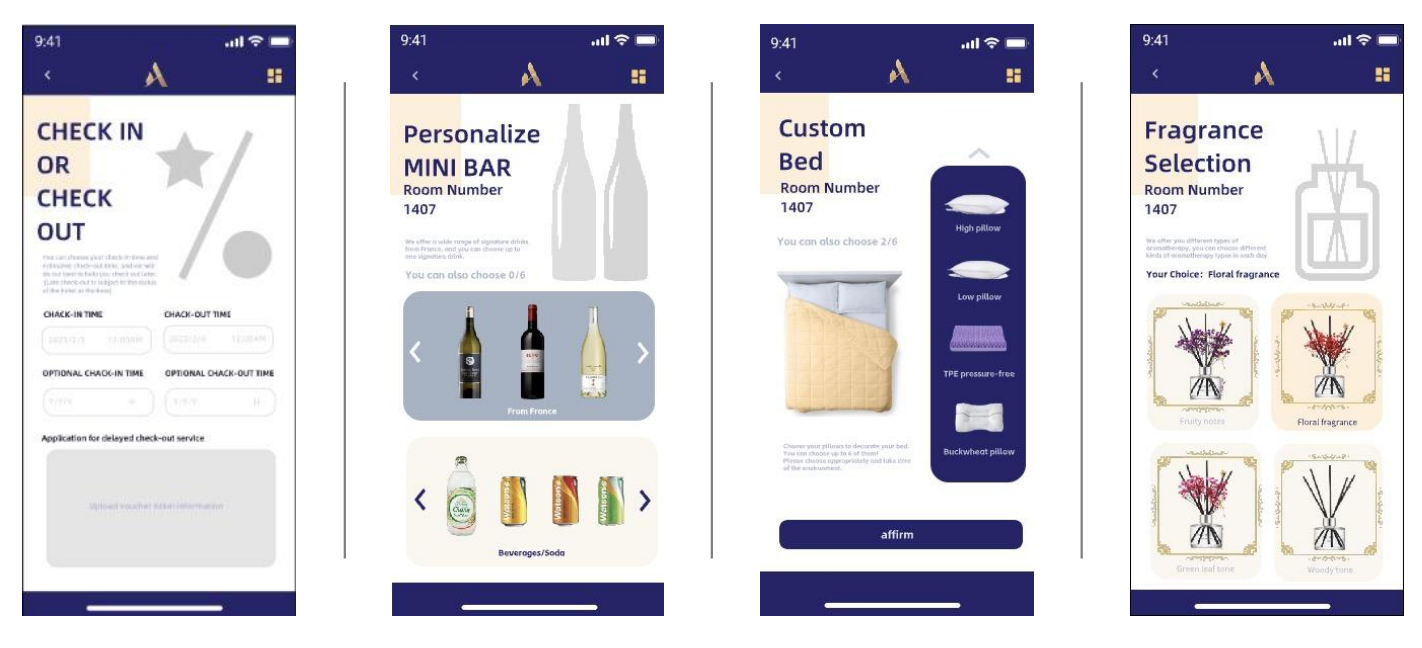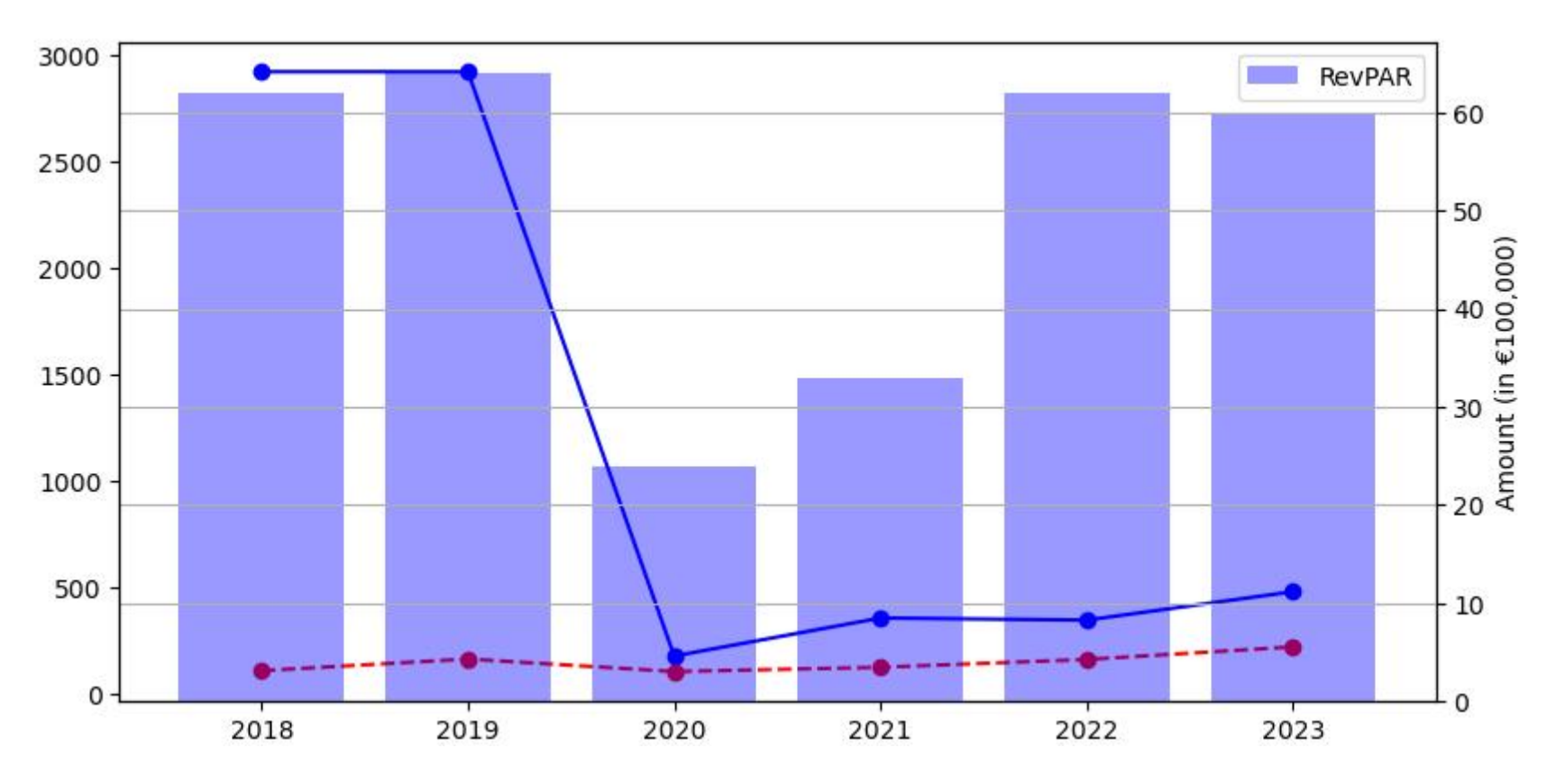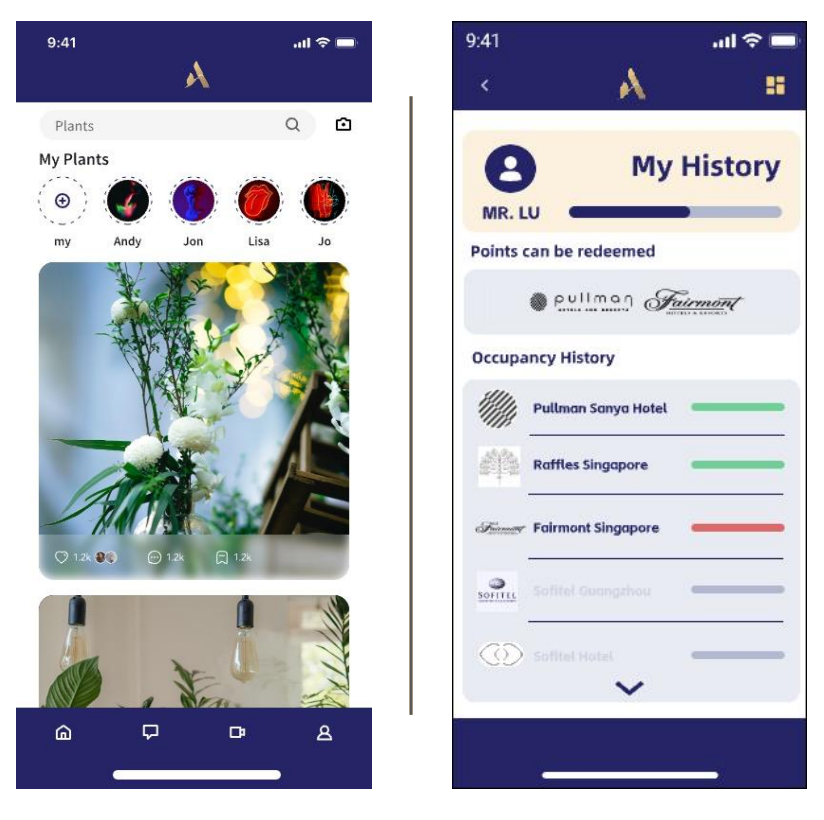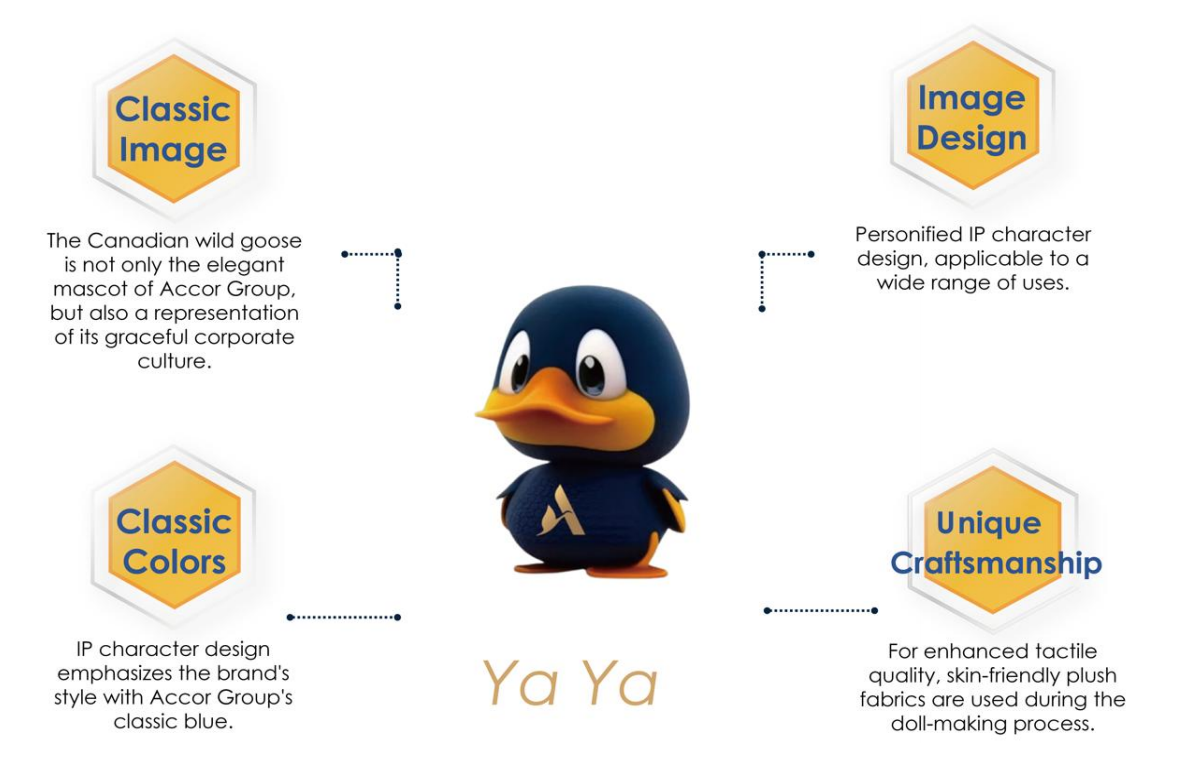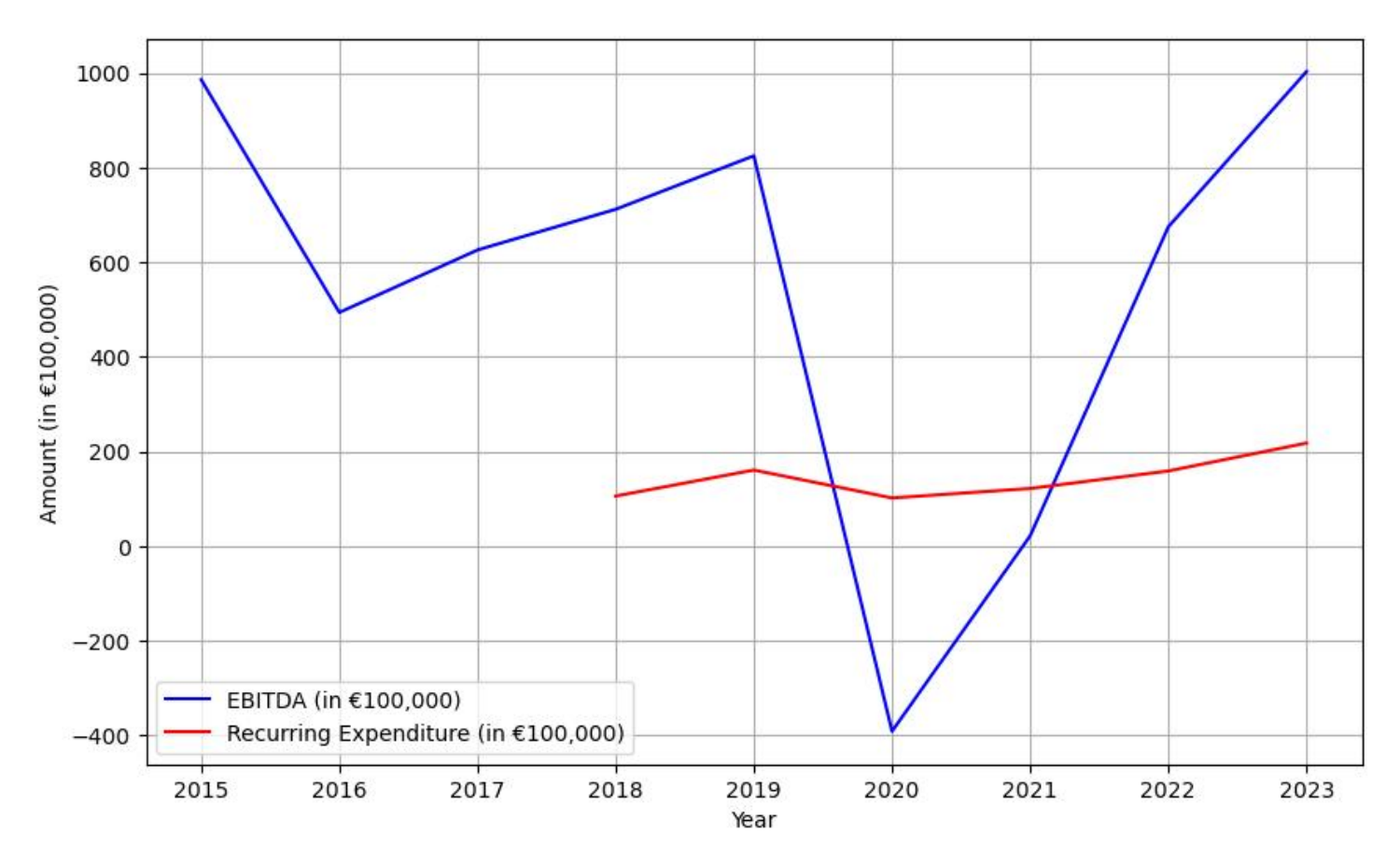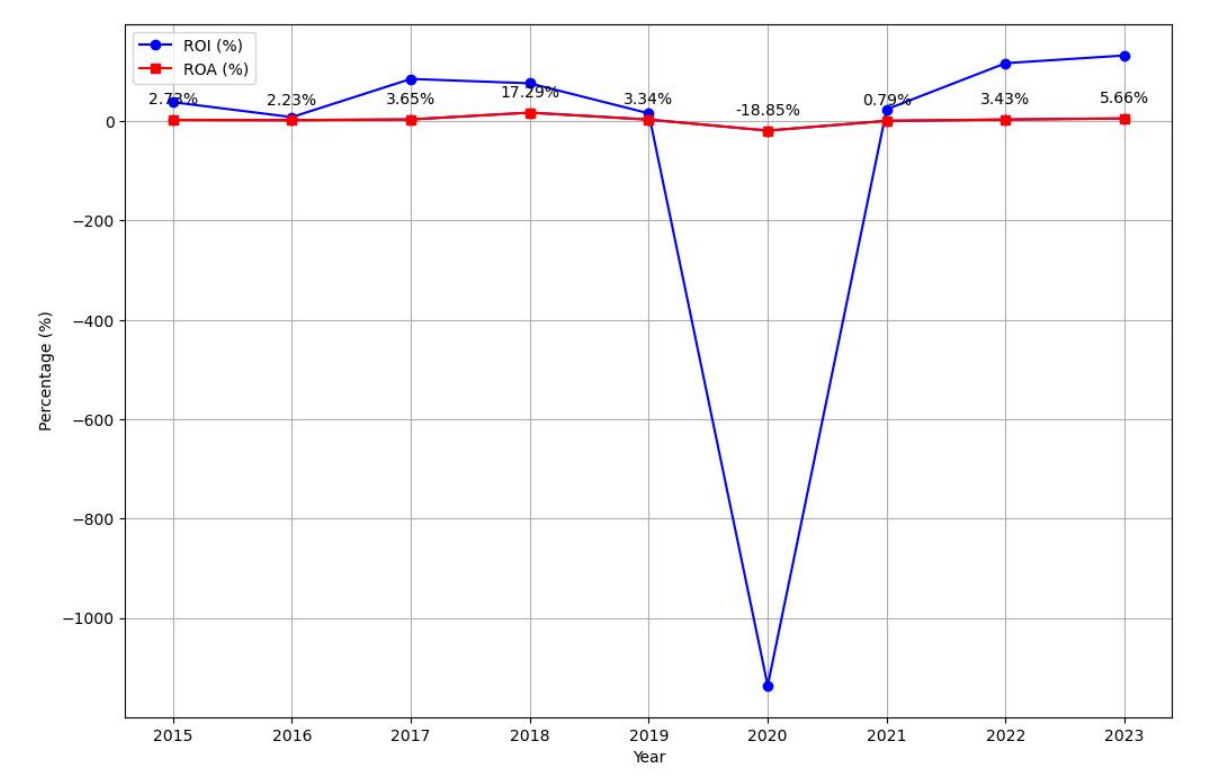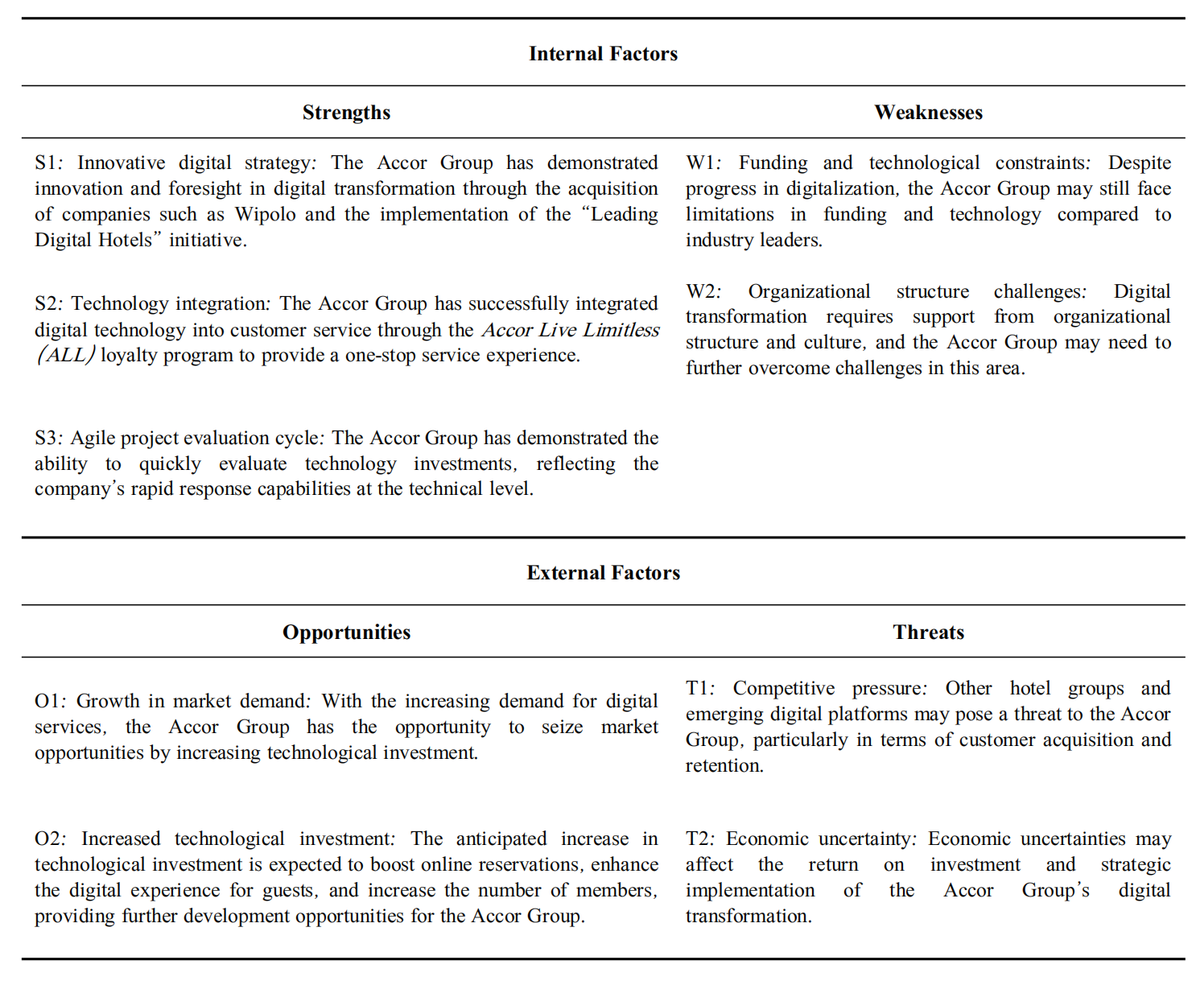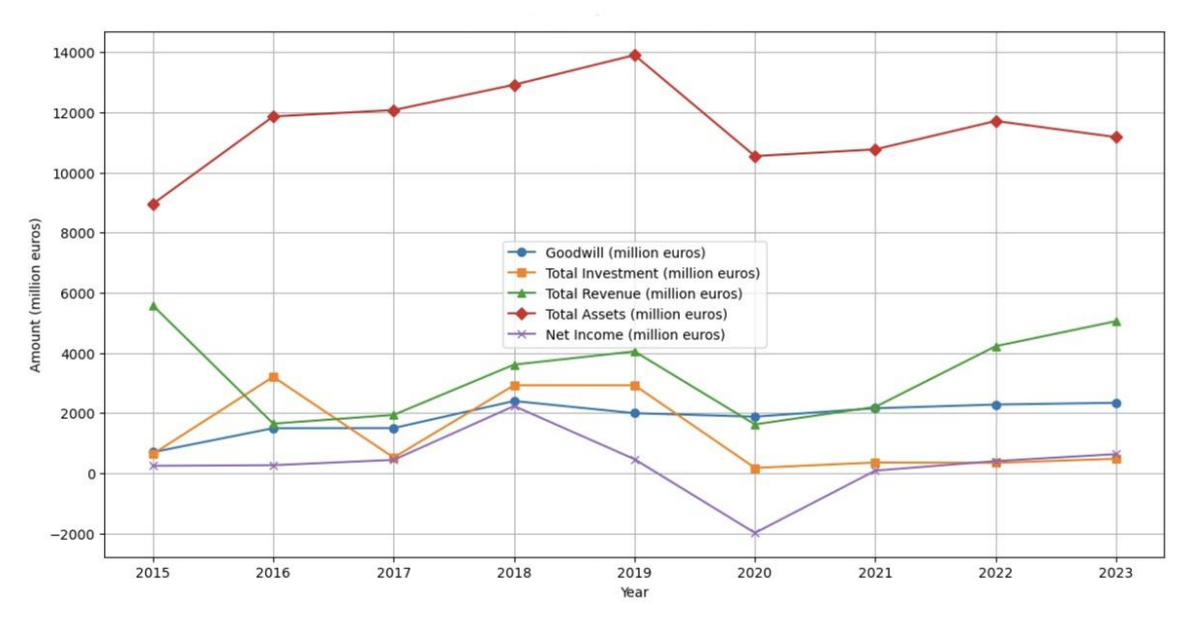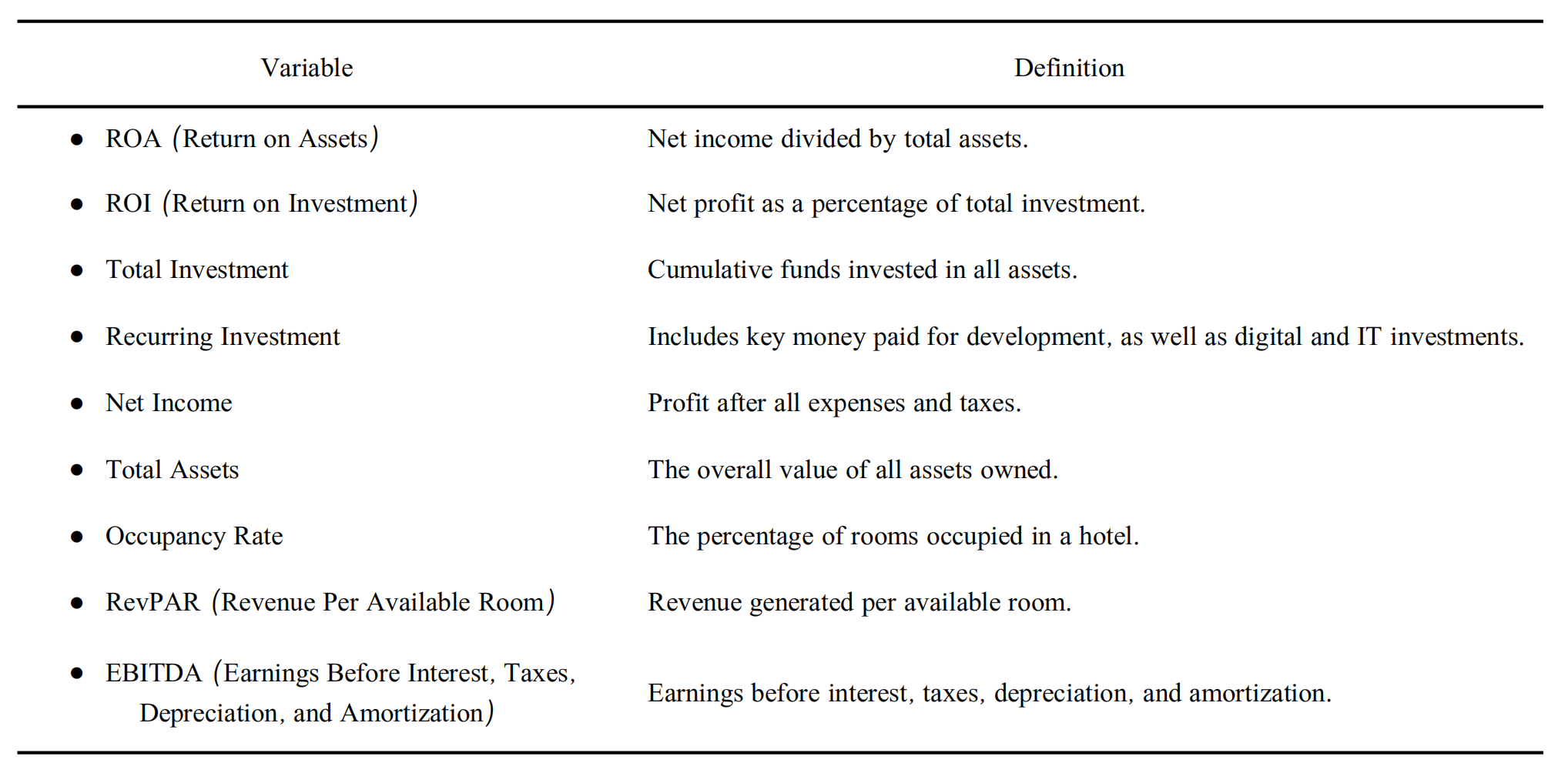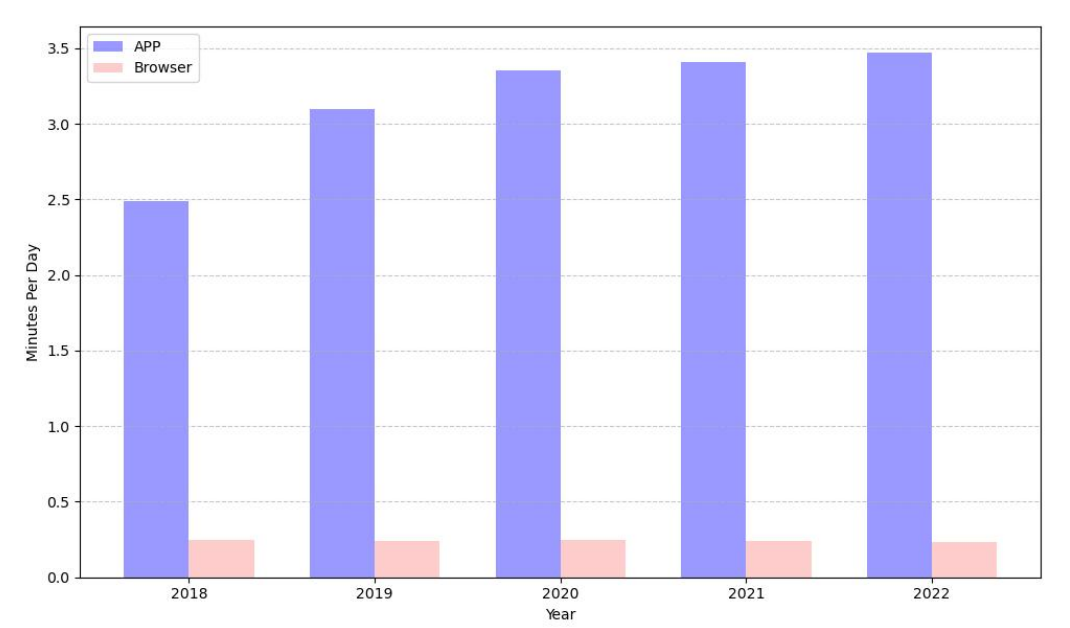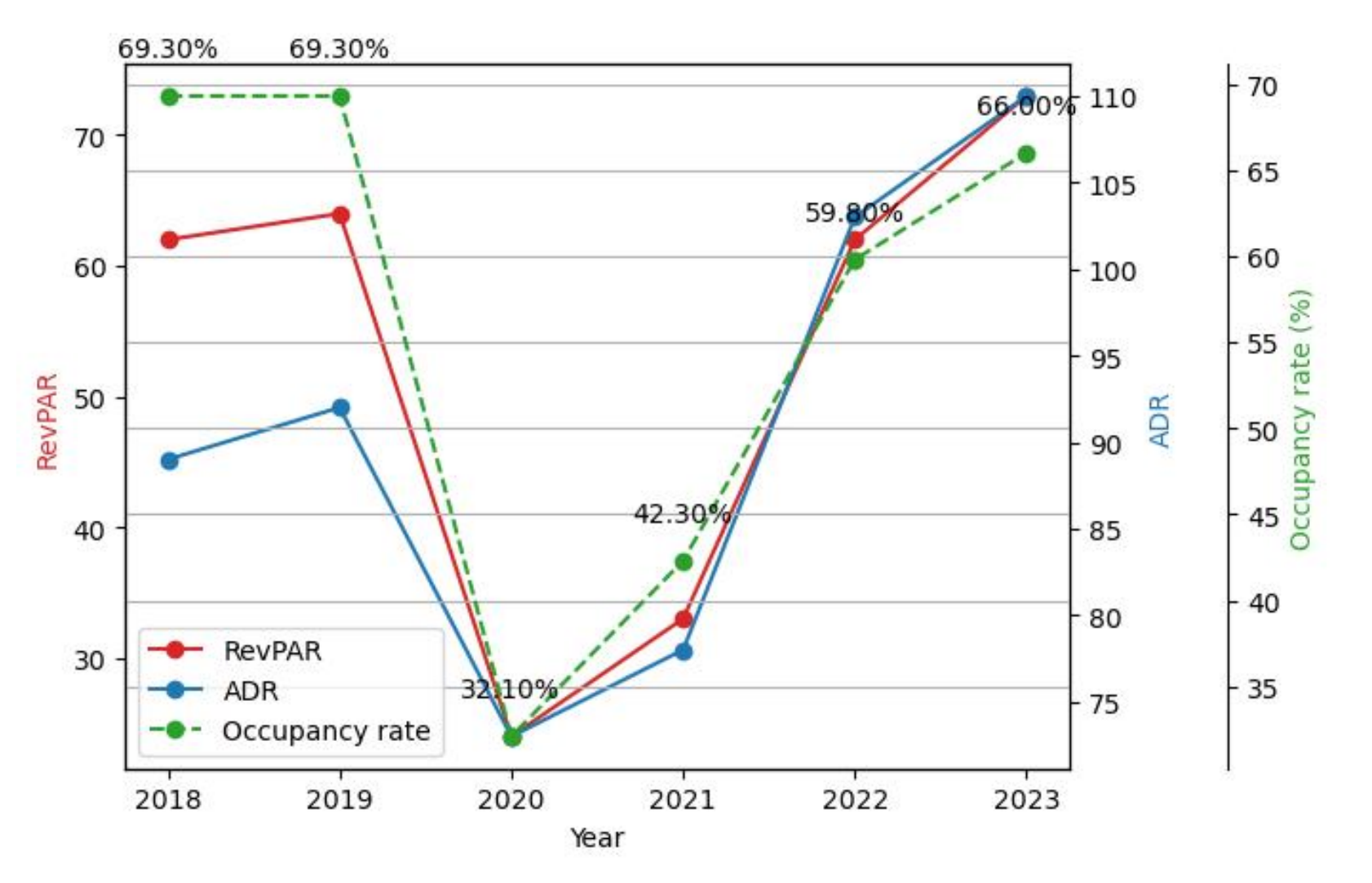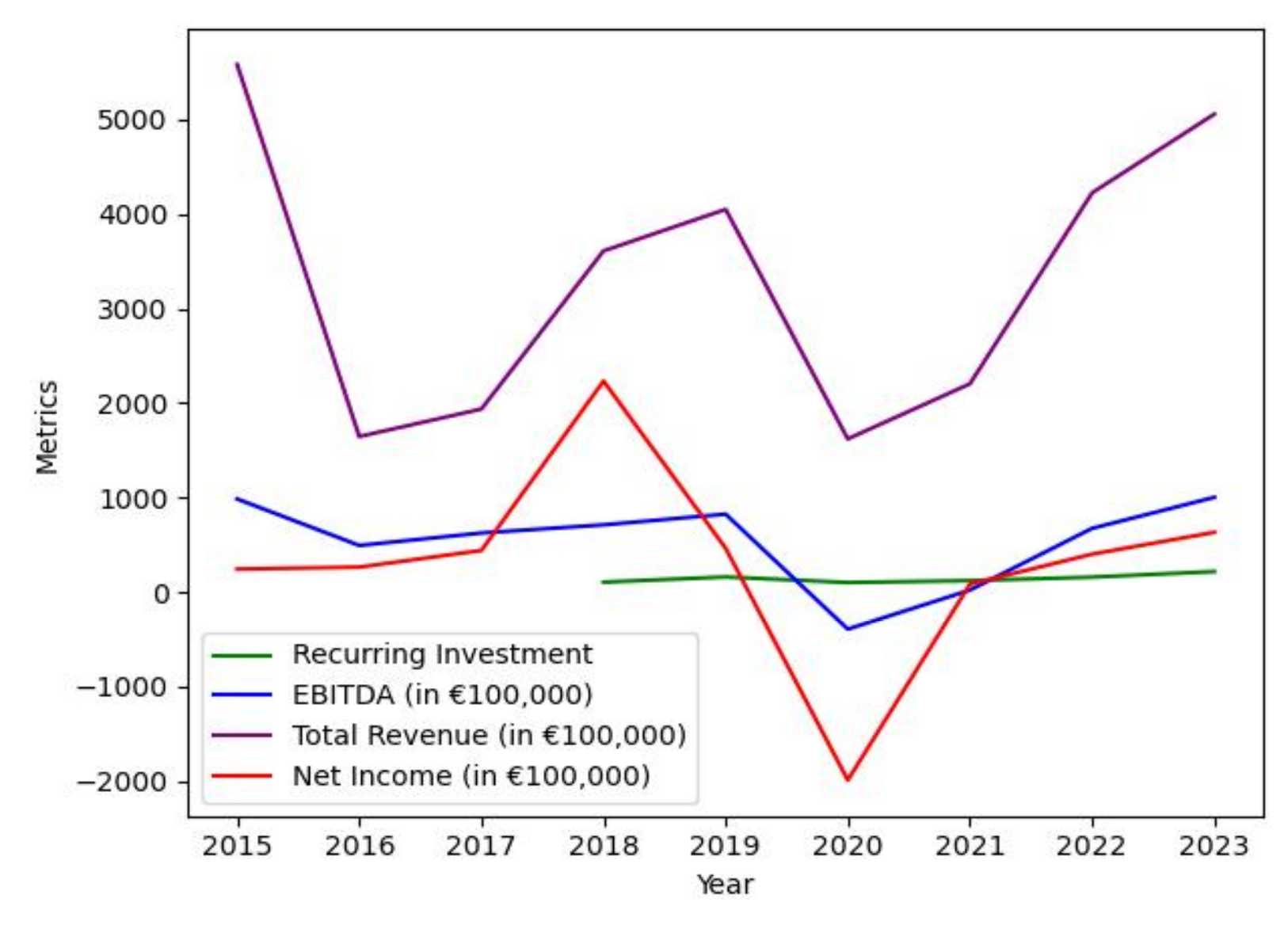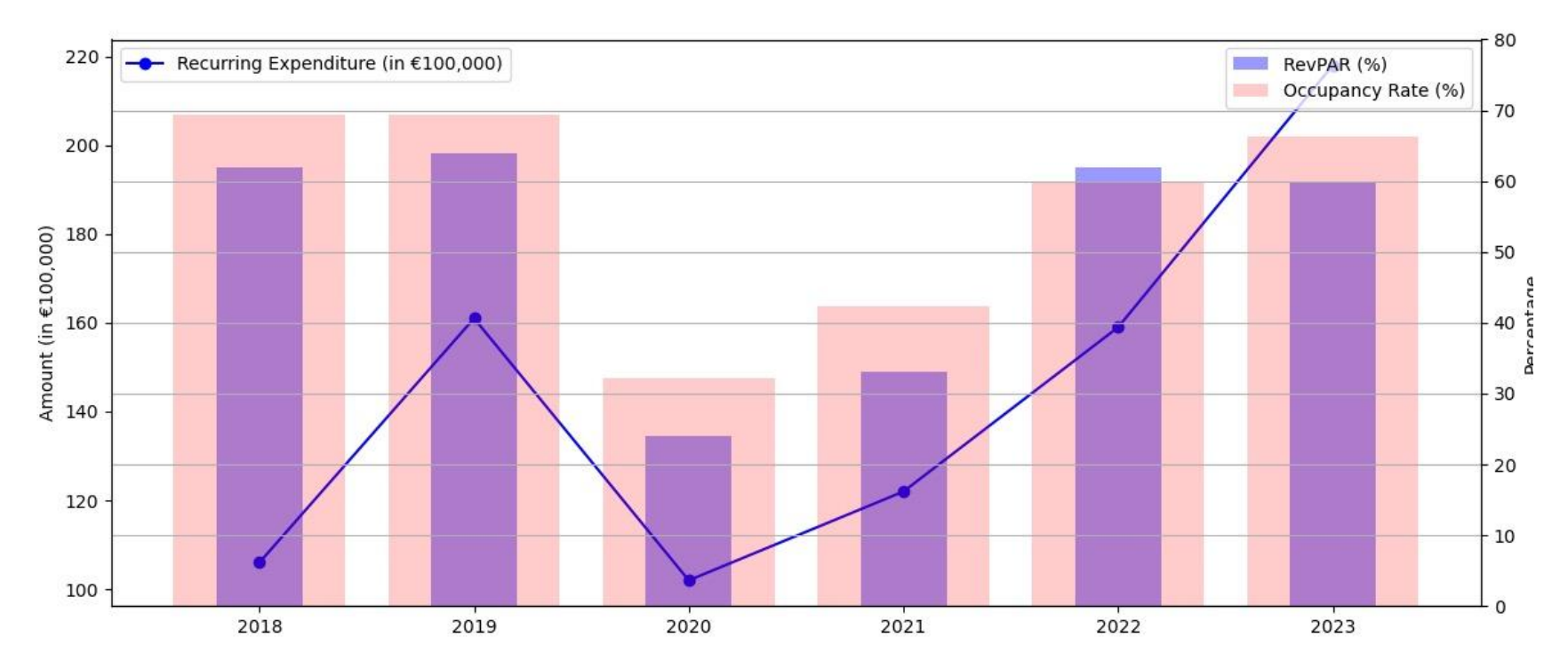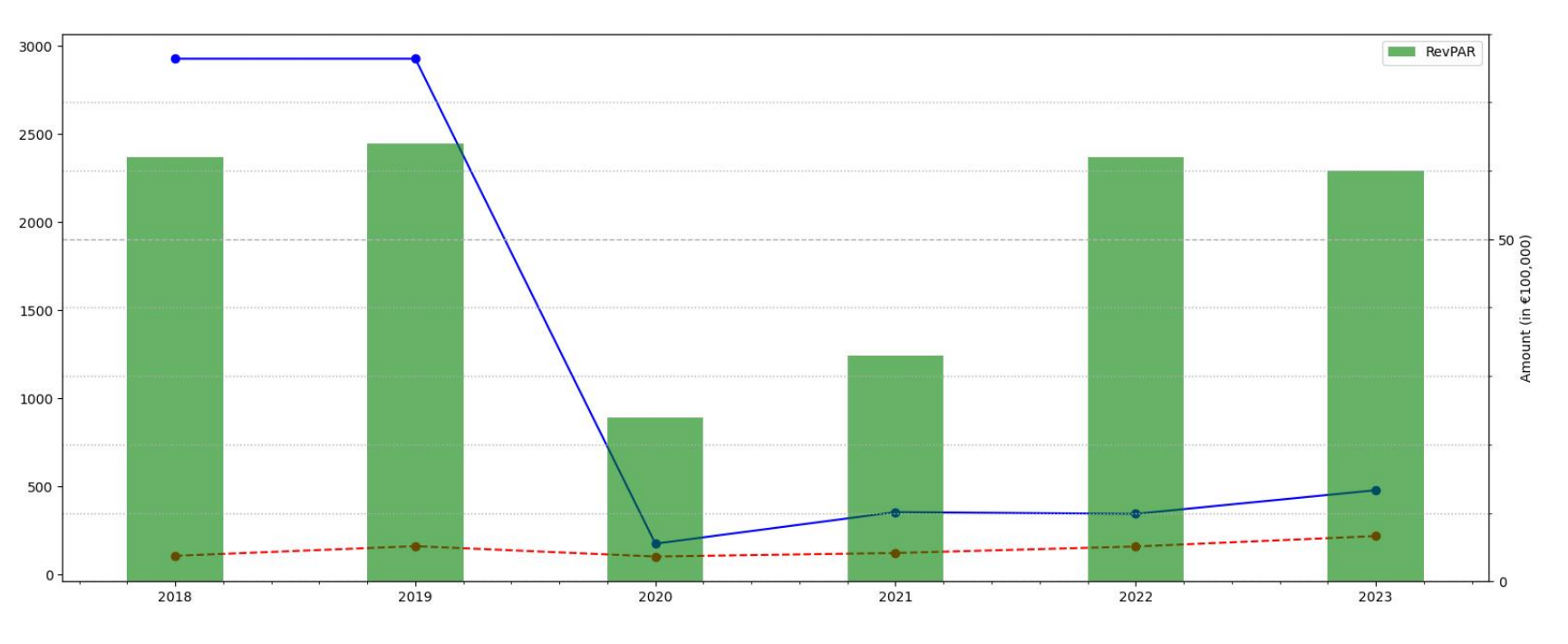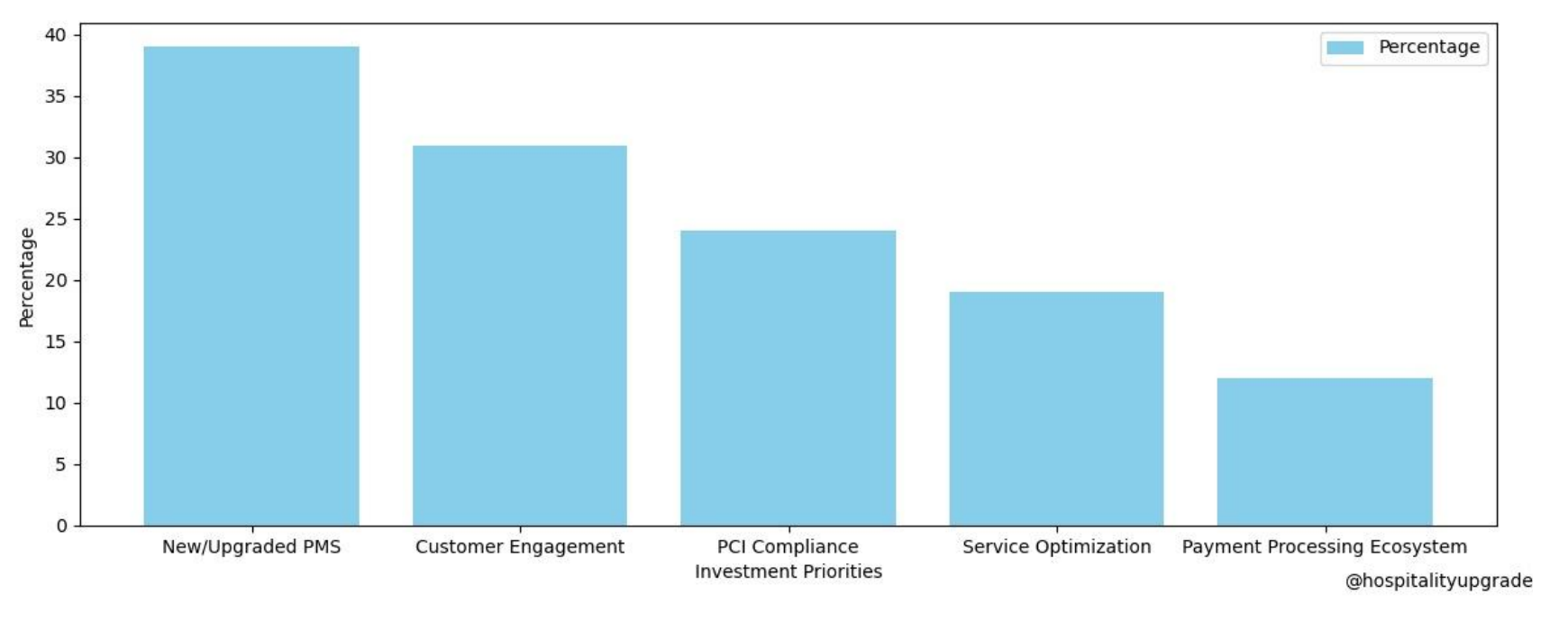Table of Contents
- Abstract
- Introduction
- Literature Review
- Methodology
- The Accor Group’s Digital Strategies
- Accor Group Financial and Operational Data Analysis
- Analysis of Digitalization Trends in the Hotel Industry
- Discussion
- Conclusion
- Author Contributions
- Funding
- Acknowledgements
- Conflicts of Interest
- References
Trends in Digitalized Hospitality Services: Accor Hotels Group’s Digital Transformation
The digital transformation of the hotel industry is an ongoing process, with leading companies continuously implementing and refining standardized digital procedures. Moreover, the industry is transforming in favour of eco-friendly operations, emphasizing the use of renewable energy and energy-saving measures to mitigate the environmental impact of hotel operations. Emerging trends such as contactless check-in, digital tipping systems, and contactless payment options are transforming traveller engagement. The integration of artificial intelligence and cloud-based solutions not only streamlines back-end processes but also customizes customer interactions and enhances service delivery [9].
Customer privacy and cybersecurity have become increasingly important issues in the hotel industry. The strategic use of data analytics, the shift towards mobile-centric services, and the implementation of mobile key entry systems are reconfiguring the hotel operational landscape. The integration of application programming interfaces (APIs) facilitates intersystem communication, enhancing service delivery and operational synergies [10]. The need to protect customer data and maintain a secure operating environment drives the adoption of strong security protocols and compliance with global data protection standards [11].
In a highly competitive market, hoteliers who do not actively pursue digital innovations risk being left behind. By fully embracing digital transformation, hotels can not only improve the customer experience but also achieve operational excellence and financial success, thereby becoming market leaders. This study focuses on analysing the benefits of digitalization and explores its significance and practical relevance in the current market. Methods include collecting and observing customer satisfaction surveys and the frequency of use of smart services across the industry to assess the contribution of digital services to improving customer satisfaction and corporate benefits. In addition, this study analyses Accor Group’s operating data and financial statements before and after key points in its digital development to quantify the potential impact of digitalization on cost-effectiveness and revenue growth.
These documents and materials are intended to provide a more comprehensive perspective on the importance and complexity of implementing digital transformation in the hotel industry.
This study aims to comprehensively evaluate the effectiveness and advantages of Accor’s digital transformation by employing a mixed-methods research approach that combines quantitative analysis and case studies to ensure the depth and breadth of the findings.
Figure 7, which shows fluctuations in RevPAR and ADR, suggests that the Accor Group has remained stable or improved in terms of operating efficiency. Occupancy has also remained high, suggesting that digital transformation efforts are effective in maintaining or increasing demand for rooms. However, high occupancy rates and a stable ADR may indicate a strong customer base that values the convenience and personalized services provided by the Accor Group’s digital transformation. An enhanced customer experience often leads to increased customer loyalty, which is critical to maintaining a steady revenue stream.
The Revenue Impact of Accor’s Digital Transformation
Figure 8 illustrates the relationship between earnings before interest, taxes, depreciation, and amortization (EBITDA) and recurring expenditures of the Accor Group from 2017 to 2023. The data indicates that despite an increase in recurring expenditure during the digital transformation process, the Accor Group has achieved an overall improvement in EBITDA. This outcome validates the returns on digital investment, showing that the company achieves higher profitability by enhancing operational efficiency and customer experience.
Revenue per available room (RevPAR) is a key indicator of hotel operating efficiency. By analysing the relationship between RevPAR and recurring expenses, we can determine how the Accor Group can improve its operating efficiency by investing in digital services and maintenance.
Introduction
Rapid digital transformation within the hotel industry has placed significant pressure on large hotel groups to enhance their service efficiency and their customers’ experiences. While the integration of digital tools and technologies has facilitated hotel services, the actual user experience still presents numerous issues, impacting overall service quality and customer satisfaction.
At present, digital technology has been applied in many aspects of hotel management, and hotel managers aspire to reduce both manpower and operational time through technology [1]. Traditional hotel operations and management have relied heavily on human resources and the accumulated experience of hotel workers; such reliance has led to inefficiencies, high operational costs, and difficulties in standardization. Digital innovation allows hotels to leverage advanced hotel management systems to optimize front- and back-office operations, thereby improving overall management efficiency. Additionally, digital supply chain management systems can enhance the efficiency of procurement, inventory, and logistics management, thus reducing operational costs. Second, consumers have certain expectations for services when they stay in hotels. After the receipt of such services is over, customers’ memories retain their “experiences” of the past; people are willing to spend more money and effort on pleasant “experiences,” which requires service quality to meet user expectations. A pleasant experience can encourage people to form loyalty to particular hotel brand consumption, and high-quality service is the foundation for increasing customer stickiness. However, the existing service processes in hotels are riddled with deficiencies and imperfections. Slow response times for room service and the untimely handling of customer feedback are frequent issues that significantly diminish the customer experience. The hotel ecosystem—comprising hotel owners and investors, managers and employees, destination management offices, hotel guests, online travel agencies (OTAs), suppliers, airlines, and event organizers—relies heavily on both organic and digital data flows. These data flows, which are facilitated both electronically and manually, enhance the strategic planning of hotel managers and the daily operational efficiency of staff. The implementation of various application systems, such as property management systems, point-of-sale systems, in-room information and entertainment systems, energy management systems, and communication systems [2], leads to disparities in process management, service standardization, and service response speeds within hotel systems. Such disparity results in inconsistent service quality and a decline in customer experience.
With the extant research, recent research on hotel digitalization focuses more on hotel management technology and hotel operator benefits and lacks research on the digital experiences of users. In view of these circumstances, this article analyses the effectiveness and advantages of Accor Hotel Group’s current digital reform to gain a deeper understanding of the future trends of hotel digitalization. This study aims to better the overall understanding of the various challenges brought about by hotel digitalization.
The Accor Group’s Digital Transformation SWOT Analysis
A SWOT analysis of the Accor Group’s digital transformation is conducting, with the aim of revealing its strengths, weaknesses, opportunities, and threats in regard to the digitalization process.
Through this SWOT analysis, the Accor Group can better understand its position in the process of digital transformation and formulate corresponding strategies to strengthen its strengths, improve its weaknesses, capitalize on opportunities, and address threats (Table 2).
Accor Group Financial and Operational Data Analysis
Analysis of the Accor Group’s 2015–2023 Financial Report Data
Figure 5, which shows an analysis of the Accor Group’s financial reports from 2015 to 2023, reveals that the Accor Group’s total revenue and net profit show an overall upwards trend. This suggests that the company has successfully expanded its market coverage and improved customer engagement during its digital transformation. Second, the increase in goodwill and total assets indicates that Accor Group has invested in intangible assets and expanded its business, which may be related to the digital infrastructure and technology that support its digital transformation strategy. The increase in goodwill and total assets may be attributed to significant investments in digital infrastructure, including the development of new technologies and systems that aim to facilitate online bookings, mobile check-ins, and personalized customer experiences. Notably, the Accor Group may have been affected by the external forces of the new coronavirus pandemic in 2020, during which its financial performance indicators may have declined. However, the rapid recovery demonstrated in the following years shows that the Accor Group’s digital transformation made the company more market adaptable. The ability to quickly transform and provide services that meet the needs of customers in the postpandemic era is crucial to a company’s resilience.
Conclusion
This article studies the impact of digital reform on the hotel industry and the future trends of digital hotels. It uses quantitative methods to conduct an in-depth analysis of the Accor Hotel Group’s financial statements and key performance indicators. EBITDA (earnings before interest, taxes, depreciation, and amortization), RevPAR (revenue per available room), operating income, operating margin, and customer satisfaction are used to summarize the relationships among recurring expenditures, RevPAR, and occupancy rates from 2018 to 2023. The effectiveness and advantages of the Accor Group’s reforms are discussed.
By incorporating relevant case studies, ACCOR’s Take Off! Challenge 2023 hotel digital service project provides certain reference significance for further research on the digital strategic deployment of hotel group companies in the future. The project explores innovative design methods for digital hotel room services and proposes a service concept that combines digital technology with people. Digital hotel room service is systematic process that includes not only the UI visual presentation of the client but also the combination of system-level services and hotel service processes. High-quality service increases customer loyalty and helps maintain a hotel’s brand image. However, in actual operation, there are many challenges faced, such as the policy environments and technical conditions of the hotel industry in different regions. Therefore, future research can aim to strengthen exchanges and cooperation with experts, scholars and hotel practitioners in the hotel industry and conduct in-depth research on the specific situations in each region to explore more practical and effective solutions to improve the operability and effectiveness of the hotel digital service strategic deployment strategy.
In this context, the concept that “digital services should work in conjunction with hotel workers” is particularly important. Although the introduction of digital technologies can improve efficiency, neglecting the needs of humanized services ultimately fails to meet customer expectations. Only by combining digital services with the services of hotel staff can a meticulous and personalized service experience be provided to customers. The application of digital technologies in hotel room services makes the service process more efficient and personalized. Through mobile applications, smart room control systems, and automated services, hotels can provide seamless customer experiences.
Hotel Digital Service Process
We hope to combine the entire check-in experience of customers with digitalization to provide customers with a high-quality service experience. When customers book hotels online, we match guests with hotel discounts for the season and recommend hotel brands on the basis of their past check-in preferences. When hotel guests check in, they can be invited to participate in the check-in ceremony. We hope that every guest who checks in can enjoy the hotel’s meticulous service. The service requests made by guests during the hotel check-in process (for example, an estimated check-in time, check-out time, minibar beverage selection, bedding selection, and indoor fragrance selection) can be performed through the upgraded group mobile terminal. Moreover, customers can also contact our online customer service manager to make service requests. During the check-out process, we provide thoughtful gifts according to the local seasonal conditions, such as hand cream, lip balm, and toothpaste. Under the Accor Group’s points system, we need to expand the number of customers of different hotel brands and let customers experience different Accor Group hotel brands. At the same time, after customers experience the hotel, they should be encouraged to share their check-in experience through the built-in community of the mobile terminal. This can make the customer’s entire digital ecological experience more complete (Figure 2).
As competition in the hotel industry intensifies, the “homogenization” phenomenon among hotel brands becomes increasingly serious. Hotel brands must not only maintain their own brand image and service quality but also pay attention to the emotional expression of the brand. IP-based branding is a marketing method that has begun to take shape in recent years. Thus, we design a new IP visual image for the Accor Group. In terms of design, we use the classic Canadian wild goose image that can reflect the corporate culture of the Accor Group; in terms of colour, we use Accor’s classic blue and yellow colour scheme. We hope that the IP image can be more experiential so that it can be applied to more hotel usage scenarios, such as hotel mobile terminals, guest room decoration, doll designs, etc. This approach not only enhances the brand recognition of the Accor Group but also deepens the emotional connection of hotel customers to the brand.
Room Service Customization
After the user completes the hotel reservation, the user can customize their room services online on the mobile terminal, such as their check-in time and expected check-out time; the selection of drinks in the room mini-bar; the recommendation of local food culture for customers; the selection of room bedding; the material and number of pillows provided; and the fragrance selection used within the room; the user can customize these room services according to their own situation. The housekeeping department receives the service requests made by the guest online and responds quickly to deliver the items to the room. In this way, the user’s experience in the room is improved (Figure 3).
Hotel Digital Case Study
This case study showcases the authors’ project in the ACCOR Take Off! Challenge 2023. The theme of the challenge was to explore what unforgettable digital and innovative experiences the Accor Group could provide to its guests to both develop and ensure their loyalty. We believe that with the development of the information age, user behaviour habits are also changing, and mobile terminals hold an irreplaceable position in people’s lives. This can be inferred from the download volume of hotel direct booking applications (Figure 1), where the hotel group’s app plays a significant role in the entire customer experience. In particular, during the pandemic, users were more inclined to use official hotel apps to obtain services to obtain more flexible cancellation policies and more direct communication and service channels [19]. Although current online booking provides more convenience and flexibility, there are still some shortcomings in service. For example, at this stage, the Accor Group’s hotel mobile terminal does not have an online room service window, which reduces the convenience level of some users’ room experience.
Figure 6, which shows fluctuations in ROI and ROA, indicates that despite market fluctuations, the Accor Group’s investment in digital transformation is generally profitable. We use net income and total investment information obtained from Accor Group’s financial report to calculate the ROI, and we use net income and total assets to calculate the ROA. We find that ROA peaked at 5.66% in 2019 and then stabilized at approximately 3-4%, reflecting the company’s return on investment [12]. Despite the fluctuations in profitability, the overall trend of ROI and ROA is positive, indicating that the Accor Group’s digital initiatives are cost-effective. Through the impact of digital transformation, the Accor Group may have reduced operating costs, thereby promoting the growth of net profit.
Abstract: As hotel digitalization has become a dominant paradigm, the hospitality industry is entering a critical phase of digital transformation. Hospitality practitioners are expected to provide more holistic and thoughtful services to meet the intricate demands of their patrons in the fiercely competitive industry. This research aims to explore how hotel operators within the Accor Hotel Group develop strategies to address their guests’ intricate service expectations while advancing their own digital transformation. This study analyses the digital initiatives of the Accor Group via a mixed-method approach. The effectiveness and benefits of the Accor Group’s digital overhaul are examined to gain insights into future trends in hotel digitalization. The study reveals that in the fiercely competitive hotel industry, Accor Group’s investment in hotel digitalization can produce tangible economic benefits. From a macro perspective, hotel digitalization, as a general trend in the industry, not only brings economic benefits to operators but also improves customer loyalty and personalized service experiences. However, further research is needed to address the application challenges and limitations of digital technology.
by
Yuhao Wu 1,
Jinxuan Li 2,
Jing Liu 1 *
1. Faculty of Innovation and Design, City University of Macau, Macau
2. Faculty of Finance, City University of Macau, Macau
* Author to whom correspondence should be addressed.
JDSSI. 2024, 2(3), 65-86; https://doi.org/10.59528/ms.jdssi2024.1031a23
Received: September 1, 2024 | Accepted: October 2, 2024 | Published: October 31, 2024
Methodology
This study adopts a mixed-methods research approach that combines quantitative analysis and case studies to ensure the depth and breadth of the research results, with the aim of comprehensively evaluating the effectiveness and advantages of the Accor Group’s digital transformation.
In research on the Accor Group’s current digital transformation, via a case study method, we conduct an in-depth analysis of the Accor Group’s digital transformation strategy and implementation process since 2014. The key success factors and challenges of digital transformation are identified by collecting and analysing public reports, press releases, and internal documents. The SWOT analysis tool is used to evaluate the internal strengths and weaknesses of the Accor Group’s digital transformation. At the same time, the authors share the project content of the Accor Group’s Take Off! Challenge 2023, propose features for digital room service, and identify external opportunities and threats. The results help provide a comprehensive understanding of the complexity and multidimensional impacts of digital transformation.
In addition, we quantitatively analyse the Accor Group’s financial data from 2015 to 2023, delving into total revenue, goodwill, total investment, total assets, net income, return on assets (ROA) and earnings before interest, taxes, depreciation and amortization (EBITDA). Descriptive statistics reveal the distribution characteristics and trends of key financial indicators and assess the long-term impact of digital transformation on a company’s financial health and performance. By conducting an in-depth analysis of the Accor Group’s financial statements and key performance indicators, this study considers the multifaceted impact of digital reforms on hotel operations. This approach includes but is not limited to customer satisfaction surveys, service usage frequency, online interaction metrics, and detailed comparisons of operational data and financial statements (Table 1).
Author Contributions
Yuhao Wu conceived and proposed this idea. Yuhao Wu and Jinxuan Li defined the analysis methods and tools. Yuhao Wu provided a design project case and drew it in the paper. Jinxuan Li analysed the data. Yuhao Wu supervised and assisted in analysing the data. Jing Liu reviewed the manuscript and provided critical feedback. Yuhao Wu synthesized feedback from all parties and finalized the draft.
Funding
The authors gratefully acknowledge the financial support from the GuangDong Basic and Applied Basic Research Foundation [2022A1515110249].
Acknowledgements
The authors would like to thank the Accor Group for providing the opportunity to participate in the Take Off! Challenge 2023. The views expressed in this paper are those of the authors and do not necessarily reflect the official policy or position of the Accor Group.
Conflicts of Interest
The author declares that they have no conflicts of interest related to this research.
Literature Review
In the academic discourse of the hospitality industry, the catalytic role of digital technology in enhancing hotel performance has consistently been a focal point of research [3]. Digital transformation is regarded not only as a strategic employment of digital technologies to reshape business processes but also as a means by which to augment customer value propositions [4]. Amidst the tide of digital transformation, the confluence of technology and emotion has emerged as a significant research topic. The hospitality industry, as a quintessential representative of this trend, has yet to fully explore the potential of its intelligent services.
Despite the widespread adoption of technologies such as mobile applications, self-service check-in systems, and smart room services, the practical application and efficacy available within these service processes still require further optimization. Digital tools such as hotel apps often serve merely as supplementary aids, whereas self-service check-in systems, although efficiency-enhancing, still necessitate substantial human assistance. As the core product of hotels, the humanized aspect of service is crucial for maintaining the bond between a brand and its patrons. Therefore, preserving emotional connections with customers amidst digital transformation has become a vital challenge for the hotel industry. Anticipating and meeting the psychological expectations of consumers are crucial factors for delivering exceptional service, necessitating meticulous planning in the interaction between digital products and customers [5].
While the significance of customer experience in the hospitality industry is being increasingly recognized, the extant research indicates that it has not yet received adequate attention [6]. The complexity and lack of user-friendliness of smart room service systems negatively impact the customer experience. Hotel enterprises must prioritize the holistic management of service quality and the influence of interface factors on the overall customer service experience. In the design, management, and optimization of service interfaces, it is imperative to consider the needs of diverse customer groups and arrange them differently according to hotel star ratings to ensure satisfactory interface experiences and evaluations for guests [7].
With the resurgence of the tourism industry and the shift in consumer preferences, a digital strategy has become particularly critical for the development of the hospitality industry. This encompasses not only the adoption of cutting-edge digital solutions, such as mobile applications and smart guestroom facilities, to enrich the customer journey but also the utilization of cloud infrastructure and data analytics to improve operations and strategic decision-making. Through the launch of its new loyalty program “ALL” (Accor Live Limitless), the Accor Group has invested $255 million to address the challenges posed by digital transformation [8].
The Accor Group’s Digital Strategies
The Accor Group’s Digital Transformation for a Hospitality Behemoth
The Accor Group, as a titan in the hospitality industry, embarked on its digital transformation journey in 2014, marked by the strategic acquisition of a French startup, Wipolo, which had developed an innovative “travel companion” application [5,11]. This move was part of the Accor Group’s broader “Leading Digital Hospitality” plan, which was aimed at rethinking and integrating digital technology throughout the entire customer service process. The initiative was designed to revolve around three core objectives—enhancing services for customers, employees, and partners—and bolstering Accor Group’s distribution market share.
The success of this digital overhaul hinged on two mainstays: robust IT infrastructure and sophisticated data management systems. To this end, the Accor Group committed a significant €225 million over five years, beginning in 2014, to this transformative program. The plan was meticulously structured, with 60% of the investment being earmarked for bolstering the Accor Group’s current performance by refining mid-end and back-end solutions. The remaining 40% was allocated to expanding the market share and optimizing the cost of distribution units [12, 13, 14, 15].
The Accor Group’s digital reform has been lauded as a paradigm for the digital transformation of the hotel industry. Through its Accor Live Limitless (ALL) loyalty program, the Accor Group has seamlessly integrated digital technology into customer service, enabling guests to book rooms, manage itineraries, and access personalized services via mobile applications. This one-stop service experience not only streamlines the customer’s interaction with services but also facilitates personalized customer management, significantly enhancing customer satisfaction and brand loyalty.
Moreover, to enhance operational efficiency and agility, the Accor Group has decided to entrust the majority of the maintenance, support, and development tasks associated with its TARS booking system—which is a cornerstone of its business—to a trusted partner [13]. This strategic delegation serves as a test of the Accor Group’s commitment to leveraging external expertise to drive internal innovation and service excellence.
Innovative strategies such as the Accor Group’s multi-property management system (PMS) approach and its venture arm’s investments in hospitality tech firms exemplify the Accor Group’s forwards-thinking mindset [13,16]. By certifying multiple PMS systems and establishing partnerships with innovative companies, Accor has ensured that its technology ecosystem is both flexible and adaptable. This approach not only improves service efficiency by flattening management operations but also enables the related hotels to provide a seamless and personalized customer experience.
Furthermore, the Accor Group’s focus on cybersecurity, contactless solutions and data harmonization highlights its commitment to user centricity, protecting guest data and enhancing the overall guest journey. By investing in security measures and adopting contactless technology, the Accor Group is well positioned to meet the evolving needs and expectations of guests.
Customer Check-in Sharing Platform and Check-in Records
Customers can share details of their stay experience on the sharing platform at any time during their stay at the hotel; they can also share and comment on their stay experience after leaving the hotel. At the same time, the stay history feature can record the information of customers in Accor Group hotel brands in different countries. We hope to build a complete customer experience platform in the future so that when a journey ends, the related memories will be saved. Such a platform will be able to retain good times for customers when they stay in a hotel (Figure 4).
References
1. D. Buhalis and R. Law, “Progress in information technology and tourism management: 20 years on and 10 years after the internet: The state of eTourism research,” Tourism Management 29, no.4 (2008): 609–623. [CrossRef]
2. Dimitrios Buhalis and Rosanna Leung, “Smart Hospitality-Interconnectivity and Interoperability towards an Ecosystem,” International Journal of Hospitality Management 71 (2018): 41-50. [CrossRef]
3. Mohammad Iranmanesh, Morteza Ghobakhloo, Mehrbakhsh Nilashi et al, “Applications of Disruptive Digital Technologies in Hotel Industry: A Systematic Review,” International Journal of Hospitality Management 107 (2022): 103304.. [CrossRef]
4. Peter C. Verhoef, Thijs Broekhuizen, Yakov Bart et al, “Digital Transformation: A Multidisciplinary Reflection and Research Agenda,” Journal of Business Research 122 (2021): 889-901. [CrossRef]
5. Alexandra Youssofi, Florence Jeannot, Eline Jongmans et al, “Designing the digitalized guest experience: A comprehensive framework and research agenda,” Psychology & Marketing 41, no. 3 (2024): 512-531. [CrossRef]
6. Hyunsu Kim and Kevin Kam Fung So, “Two decades of customer experience research in hospitality and tourism: A bibliometric analysis and thematic content analysis,” International Journal of Hospitality Management 100 (2022): 103082. [CrossRef]
7. Chaowu Xie and Xiangmin Zheng, “A Comparative Study of Customer Interface Expectations and Perception in the Hotel Industry,” Journal of Huaqiao University: Philosophy and Social Sciences Edition, no. 3 (2009): 10. DOI: 10.3969/j.issn.1006-1398.2009.03.007.
8. “Hotel Technology Trends: 20 Upcoming Innovations of 2024 You Must Know,” Martijn Barten, Revfine.com, Last modified June 7, 2024, https://www.revfine.com/hotel-technology.
9. “Hospitality Trends in 2024: What’s Changing?” Adyen, Last modified January 23, 2024, https://www.adyen.com/knowledge-hub/hospitality-trends.
10. “Technology in Hospitality: 20 Trends Shaping the Industry in 2024,” Jordan Hollander, HotelTechReport, Last modified December 8, 2023, https://hoteltechreport.com/news/tech-in-hospitality.
11. “Latest Trends To Look For Digital Transformation in Hospitality,” Darshan Thakkar, Medium, Last modified October11, 2023. https://medium.com/latest-trends-in-industries-by-trootech/latest-trends-to-look-for-digital-transformation-in-hospitality-6ac77a161a40.
12. “Financial Result, 2014-2023 Full Year Report,” ACCOR, https://group.accor.com/en/finance/results-and-publications/financial-result.
13. “AccorHotels partner to Viva Technology Start Up. Paris, 2016,” AccorHotels, https://group.accor.com/api/accorhotels/PressRelease/GetFile/?id=%7B8E843C80-99F6-451A-BF1A-2E3CBEB67762%7D.
14. “Travel Trends Report 2024 - Accor European Travel Trends,” Accor, 2024. https://accoreuropeantrends.com/traveltrendsreport2024.
15. “THE IMPORTANCE OF REVIEWS & REPUTATION,” ACCOR, 2023, https://accoreuropeantrends.com.
16. “AccorHotels – Taking care of a critical application in a 5 star services centre – Case Study,” Atos, Last modified July 2016, https://atos.net/en/solutions/accor-hotels-booking-system-case-study.
17. “Accor’s Innovative Tech Strategy is the Key to Digital Transformation in Hospitality,” Jordan Hollande, HotelTechReport, Last modified May 18, 2023, https://hoteltechreport.com/news/accors-innovative-tech-strategy.
18. “Accor accelerates its digital strategy by taking over Fastbooking,” Accor, 2015, https://group.accor.com/-/media/Corporate/Investors/Documents-financiers/2015/04/17/cp_accor_fastbooking_avril2015.pdf.
19. “The Rise of Direct Bookings over OTAs-Hotel distribution trends in EMEA and APAC from 2017 to 2020,” D-EDGE, Last modified November 17, 2020, https://www.d-edge.com/the-rise-of-direct-bookings-over-otas.
20. “105 Critical Business Travel Statistics: 2024 Spending & Concerns Analysis,” James Anthony, FinancesOnline, Last modified May 28, 2024, https://financesonline.com/business-travel-statistics.
21. “HVS Global Hotel Industry: 2023 Recap and 2024 Outlook,” HVS, Hospitality Net, Last modified December 5, 2023, https://www.hospitalitynet.org/news/4119446.html.
22. “11 Hot Digital Trends in the Hotel Industry of 2024,” Martijn Barten, Revfine.com, Last modified June 25, 2024, https://www.revfine.com/digital-trends-hotel-industry.
23. “2024 Hospitality Industry Spend Survey,” Sally Kelly, Hospitality Upgrade Magazine | Hospitality Technology News, Last modified March 1, 2024, https://www.hospitalityupgrade.com/magazine-articles/2024-hospitality-industry-spend-survey.
24. “Hospitality Tech Investment Pays off,” PricewaterhouseCoopers, PwC, Last modified July 15, 2023, https://www.pwc.com/us/en/industries/consumer-markets/library/hospitality-tech-investment.html.
25. “109 Hospitality Statistics You Must Know: 2024 Data Analysis & Market Share,” Nestor Gilbert, FinancesOnline, Last modified May 29, 2024, https://financesonline.com/hospitality-statistics.
26. “5 Trends in Global Hospitality and the Outlook for Digital Transformation,” Michelle Bruno, News on Travel Technology, Distribution and the Digital Economy | PhocusWire, Last modified December 14, 2023, https://www.phocuswire.com/yanolja-5-trends-global-hospitality-outlook-digital-transformation.
According to the data analysis shown in Figure 9, from 2018 to 2023, the Accor Group’s total investment and recurring expenditures increased annually, and the revenue per available room (RevPAR) also demonstrated an upwards trend. This shows that, through investment in digital technology, the Accor Group has significantly improved its operational efficiency, thereby further driving its revenue growth.
Figure 10 presents other financial and operational metrics, including operating income, operating margin, and customer satisfaction. Data analysis reveals that digital transformation has positively affected key financial indicators of the Accor Group. Notably, the improvement in customer satisfaction indicates that digital technology has played a role in enhancing the customer experience, thereby promoting overall revenue and profit growth.
Figure 11 summarizes the relationships among recurring expenditures, RevPAR, and occupancy rates from 2018 to 2023. The data show that with the increase in recurring expenditures, RevPAR and the occupancy rate have also shown a clear upwards trend.
The Accor Group’s recurring expenditures range from 106 million euros in 2018 to 161 million euros in the following year and then to 218 million euros in 2023. This indicates that Accor Group has been continuously increasing its investment in technology and maintenance during the digital transformation process to enhance its service quality and customer experience.
Figure 12 once again confirms the relationship between the Accor Group’s total investment, recurring expenditures, and RevPAR during the period ranging from 2018 to 2023. The data show that during the digital transformation process, although investments and expenditures have increased, RevPAR has also improved accordingly. The Accor Group has achieved more efficient resource allocation and operational management through digital transformation, ultimately increasing overall returns.
Analysis of Digitalization Trends in the Hotel Industry
With the continuous advancement of technology, digitalization has become an inevitable trend in the development of the hotel industry. Globally, the hotel industry is undergoing unprecedented changes, with digitalization and artificial intelligence (AI) playing key roles in enhancing customer experience, optimizing operational efficiency, and strengthening market competitiveness [20, 21].
With the introduction of digital technologies such as mobile applications, self-service check-in systems, and smart room services, the traditional hotel service model has changed, helping hotels provide more convenient and personalized customer experiences. From a global perspective, the hotel industry’s investment in and share of digital and artificial intelligence technologies and technology upgrades are both increasing. From North America to Europe, Greater China and Asia Pacific, major hotel groups are actively investing in digital technologies by not only looking for newer and better digital technologies with which to improve hotel services but also striving to gain an advantage in fierce market competition.
Different regions have different characteristics in terms of the development of digitalization in the hotel industry. According to the HVS Global Hotel Industry: 2023 Recap and 2024 Outlook Report and other industry reports, the digitalization of the hotel industry in North America focuses more on improving the customer experience and optimizing operational processes. However, in Europe, the hotel industry focuses more on achieving sustainable development and environmental protection goals through digital means. In Greater China, with the popularization of mobile payments and mobile applications, the digitalization of the hotel industry has become more extensive, covering every service feature from booking to check-in to check-out. The Asia Pacific region is exploring how to improve service quality and customer satisfaction through digital means [8, 9, 11, 17, 21, 22].
From a macro perspective, the global hotel industry is on the verge of significant recovery, with international tourism expected to reach prepandemic levels in 2024. This recovery is driven by the release of pent-up travel demand, increased air connectivity, and strong recovery in Asian markets. The economic impact of this recovery will be enormous, with international tourism revenues expected to reach $1.4 trillion in 2023, almost on par with prepandemic figures. This expected recovery not only demonstrates the resilience of the industry but also its potential for further growth.
From a micro perspective, the digital transformation of the hotel industry is driven by strategic investments in technology aimed at improving operational efficiency and enriching the customer experience. The surge in PMSs, customer relationship management (CRM) solutions, and mobile applications not only streamlines hotel operations but also personalizes guest interactions. The integration of smart room control, mobile keyless entry, and contactless services reflects the industry’s commitment to innovation and customer satisfaction. In addition, the hotel industry’s embrace of data analytics using digital technologies enables businesses to make informed decisions, optimize pricing strategies, and improve marketing strategies, thereby gaining a competitive advantage in an increasingly competitive market.
With the increasing popularity of artificial intelligence worldwide, digital technology plays a vital role in improving customer experience and loyalty. Through mobile applications and online platforms, customers can not only easily book rooms but also directly manage their itineraries and enjoy personalized services. This one-stop service experience not only simplifies the customer’s travel process but also effectively improves customer satisfaction and loyalty. In addition, digital technology provides new opportunities for hotels to collect and analyse customer data better, thereby providing customers with more accurate and personalized services. By optimizing service processes and solving customer problems through applications or online platforms, the hotel industry can reduce the information gap between employees and customers, simplify service processes, reduce labour costs and improve the customer experience, thereby achieving the goals of reducing costs and increasing efficiency. This cost-effective strategy not only enhances the market attractiveness of hotels but also raises the industry’s entry barriers; it is also helpful for the standardized and rapid development of the hotel industry.
Today, technological innovation in the hotel industry is pushing the flexibility of related businesses to new heights. By introducing technologies such as artificial intelligence, the Internet of Things (IoT), virtual reality (VR) and augmented reality (AR), the hotel industry can provide richer and more diverse services. These technologies not only enhance the customer experience but also bring new sources of revenue and business opportunities to the hotel industry [22].
By investing in the modernization of technology platforms and loyalty programs, the Accor Group has successfully improved its competitiveness in the global market. Numerous industry reports also show that digital investment and technological innovation are the keys to driving the future development of the hotel industry. As consumers’ demand for personalized and unique experiences continues to grow, the hotel industry needs to continue to invest in digital solutions to meet market demand and remain competitive. This comprehensive digital transformation approach ranging from IT infrastructure to data management and customer engagement has made the digital transformation of the hotel industry a necessary path for rapid development and set a benchmark for the digitalization of other industries [20, 23]. In summary, on the basis of the digital transformation strategy of the Accor Group, this article has sparked a discussion of the overall development trend of the digital transformation of the hotel industry. By reading many reports and comments from hotel reviewers, we have concluded that the digital transformation of the hotel industry is in full swing worldwide. In addition to using the latest artificial intelligence technology, improvements in digital technology can also provide a larger data analysis library for hotel groups or the hotel industry, laying a solid foundation for good customer service or hotel service upgrades [24, 25].
Industry Trend Analysis
A joint study by Skift and Amazon Web Services (AWS) revealed that the COVID-19 pandemic that began in 2020 had a profound impact on the hotel industry, compelling many hotels to embrace digital transformation. Travellers now expect greater online preselection capabilities, digital communication, and contactless service solutions, all of which necessitate a change in the way hotel groups and companies serve their customers. Additionally, with hotel industry employees utilizing new digital collaboration tools such as smartphones and iPads to transition to remote work and maintain productivity, hotel business owners are faced with the decision of whether to adopt new ways of working [23, 24, 25].
In the 1990s, the Accor Group established its own PMS, known as FOLS, due to the lack of outstanding options suitable for all its markets. Approximately half of Accor’s 5,200 hotels still use the PMS; these are eco-hotels and mid-scale hotels, for which the solution remains highly appropriate. However, as the Accor Group expanded into the upscale and luxury segments, the FOLS system no longer met the property-level needs of these hotels.
Research from hospitalityupgrade.com has revealed that traditional PMSs, which have become outdated, inflexible, and inefficient, are unable to meet the evolving needs and expectations of the postpandemic hotel industry and its customers. In 2024, the top hotel investment priority remains the replacement of PMSs. The adoption of new PMSs not only aligns with the changing expectations of guests and employees and the availability of cloud-based technology but also further propels digital transformation, as shown in Figure 13. This enables hotels to provide a more personalized and frictionless experience for both internal and external consumers. The second major investment focus is on customer interaction solutions. This investment focuses primarily on hotel groups choosing to invest more in technology-driven customer personalization, upgrading digital services to enhance customer interaction with hotels. This approach not only helps hotels attract today’s tech-savvy travellers but also simplifies and personalizes their services, thus improving customer satisfaction and loyalty and gaining a competitive edge in the market [24, 25].
Discussion
Implementation Strategies of Digital Services in Cross-cultural Contexts
In the process of digital advancement in the context of globalization, users with different cultural backgrounds may have cognitive biases towards the same services. Therefore, when promoting digital services in different regions, it is necessary to dynamically adjust the application of digital services to different cultural differences to achieve the localization of services and maximize benefits. In addition, there may be differences in the construction of digital infrastructure in different regions. In areas with weak digital infrastructure construction, a progressive digital service implementation strategy needs to be adopted. While the benefits brought about by digital services in these areas are not significant in the early stage, companies that prioritize the deployment of digital services in these areas can first occupy the local market and expand the localization attributes of digital services. In areas with well-established digital infrastructure, enterprises can seek differentiated digital services, such as humanistic care at the psychological level of users and convenient digital services for disadvantaged groups, with the aim of establishing emotional connections with users and enhancing the company’s social responsibility and brand value.
In addition, the design of digital services should fully consider the behavioural patterns and cultural background of local users. During the client design process, it is necessary to examine the behavioural characteristics of target users in the region and understand the preferences and needs of the target group. On the basis of these insights, to enhance the cultural adaptability of digital services, it is crucial for local users to participate in digital service design. The participatory design method achieves cooperation with local users and helps them understand their behavioural preferences and specific needs in a cultural context. Improving the user experience can guide digital service development strategies and internal organizational innovation. This bottom-up design method is conducive to stimulating innovation within enterprises and improving the adaptability and competitiveness of digital services in a multicultural context.
Accessible Digital Services
With the rapid development of global digitalization, digital service systems play a vital role in improving the quality of life of vulnerable groups. This is especially true in the field of services for vulnerable groups; as highlighted by the increasing ageing of the global population, elderly users demonstrate diverse needs when using services. Therefore, digital services need to provide a smooth transition period for elderly users to ensure that they can gradually adapt to the digital environment.
In this transition process, both retaining and optimizing traditional service methods are crucial factors. For example, the combination of manual assistance services and digital services can provide more flexible options for special users. This progressive service model can not only help them gradually adapt to the convenience brought by new technologies but also reduce the psychological rejection of digital services caused by maladaptation during the transition period.
Moreover, a simple and intuitive digital service system design is crucial. In the process of system upgrades and design, an interface design should fully consider the needs of various users. For example, by reducing the cognitive load to optimize the operation interface to improve ease of use, situational awareness technology can be introduced through algorithms, and the interface can be dynamically adjusted according to user usage habits. In addition, it is also possible to invite users to participate in barrier-free digital service design and jointly create solutions that meet actual needs to improve ease of use. This ensures that users will not be confused or frustrated by technical complexity.
Ultimately, the design and promotion of accessible digital service systems should focus on inclusivity, ensuring that users, regardless of age or technical proficiency, can enjoy a convenient digital experience. This not only increases user satisfaction but also enhances a brand’s social influence and reputation.
Research Limitations and Prospects
The results of this study show that the digitalization of the hotel industry presents a diverse regional pattern, with different regions focusing on distinct aspects of digital innovation. This diversity underscores the need for tailored digital strategies that cater to regional preferences and technological capabilities. Moreover, the interplay between technology and the human touch in service delivery and the potential of emerging technologies such as AI, IoT, VR, and AR to revolutionize service offerings and create immersive guest experiences cannot be overlooked. Consistent with research findings, digital service delivery can improve service efficiency; in addition, the human element remains critical in crafting a memorable customer experience. Thus, balancing these elements is key to creating a holistic service strategy that resonates with customers.
Owing to the limited data sources and the constraints on research capabilities and conditions, the following aspects need to be developed and improved.
First, the authors of this article are part of the ACCOR Take Off! Challenge 2023 digital room service project. Although the project suggests the possibility of advantages in improving the efficiency of room service, it is limited by the fact that the project is in the conceptual stage and that no user testing has been carried out. There is a lack of research on user behaviour habits, and there may be limitations in the implementation process. Future research can attempt to combine user testing and other methods to conduct multiangle and multilevel analyses to obtain a more comprehensive user behaviour study.
Second, owing to the limited data sources available, the research basis of this paper on the Accor Group and the hotel industry relies mainly on the Accor Group’s financial reports and authoritative industry reports. In addition, owing to the insufficient sample size of the digital industry trends in the hotel industry in this study, the main research basis stems from research and questionnaire surveys drawn from major websites rather than the data survey initiated by the authors. Furthermore, the inability to prove the universality and representativeness of the results leads to the research results being limited and insufficient, which means that the digital trends in the hotel industry demonstrated in this paper may have certain deviations or limitations. Therefore, future research can actively initiate data surveys within the industry, adopt more diverse data sources, expand the scope of data collection and partition data processing, and compare different situations in various regions for empirical analysis to improve the reliability of the research results.
Share and Cite
Chicago/Turabian Style
Yuhao Wu, Jinxuan Li and Jing Liu, "Trends in Digitalized Hospitality Services: Accor Hotels Group’s Digital Transformation." JDSSI 2, no.3 (2024): 65-86.
AMA Style
Yuhao Wu, Jinxuan Li and Jing Liu. Trends in Digitalized Hospitality Services: Accor Hotels Group’s Digital Transformation. JDSSI. 2024; 2(3): 65-86.
© 2024 by the authors. Published by Michelangelo-scholar Publishing Ltd.
This article is published under the Creative Commons Attribution-NonCommercial-NoDerivs 4.0 International (CC BY-NC-ND, version 4.0) license (https://creativecommons.org/licenses/by-nc-nd/4.0/), which permits non-commercial use, distribution, and reproduction in any medium, provided the original work is properly cited and not modified in any way.

